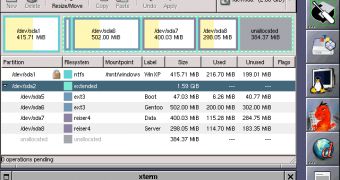SystemRescueCd, the Gentoo-based Linux distribution, made up of a large number of hard disk partitioning and data rescue applications, reached version 1.0.1 today.
One of the most important changes in this version is the switch from the Window-Maker window manager to JVWM 2.0.1. This will be the default one from now on. The root filesystem will be unionfs 2.2.4, with all files writable.
Here is the list with the other highlights of SystemRescueCd 1.0.1:
? Updated sys-block/gparted to 0.3.6 (add support for the labels) ? Updated squashfs to 3.3 (with LZMA compression) to save space ? Updated sys-fs/ntfsprogs to 2.0.0 since it's marked as stable in gentoo ? Updated sys-fs/ntfs3g to 1.2310 (ntfs full read-write support) ? Updated the Memtest86+ floppy disk image to 2.01 ? Updated the btrfs filesystem support to 0.13 (kernel patch and utils) ? Updated the default kernel to Linux-2.6.24.04 with Reiser4 (rescuecd + rescue64) ? Updated app-cdr/cdrkit-1.1.7.1 (Fix for Joliet directory length bug) ? Added sys-apps/ipmitool (Utility for controlling IPMI enabled devices) ? Added missing crypto modules in the default kernel (rescuecd + rescue64) ? Added skipmount=/dev/xxx option that prevents the system from mounting a device ? Replaced cryptsetup-luks with cryptsetup-1.0.5 ? Autodetect software raid volumes at boot time using 'mdadm --auto-detect' ? Fixed an autorun bug introduced in 1.0.0: no stdout for interactive scripts ? Fixed bugs in the network configuration boot options (ethx, gateway, dns) ? Fixed problems with udhcpc client when multiple ethernet interfaces exists ? Prevents multiple setkmap when "sysresccd-custom setkmap" used several times
SystemRescueCd is a good solution when you have trouble with your system, and you need to repair it and recover data after a crash. Besides, you can use it to create or edit the partitions available on your hard disk. Along with the partitioning and administrative tools, you get some basic applications too, like text editors, file managers and network tools. The kernel supports the most used file systems at this moment: ext2/ext3, reiserfs, reiser4, xfs, vfat, etc.
Download SystemRescueCd right now from Softpedia.

 14 DAY TRIAL //
14 DAY TRIAL //